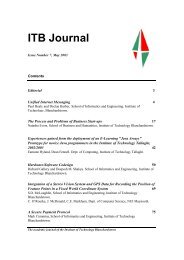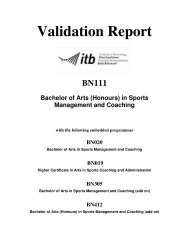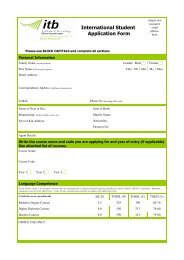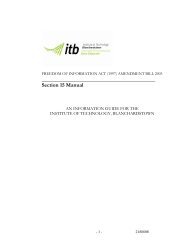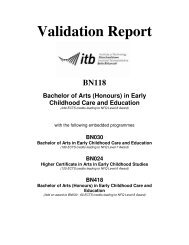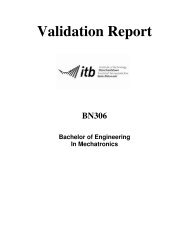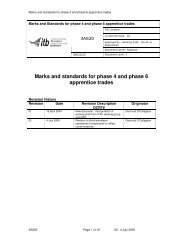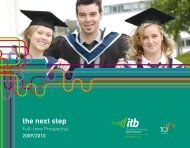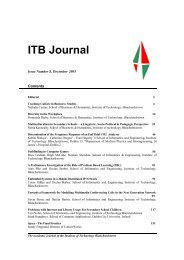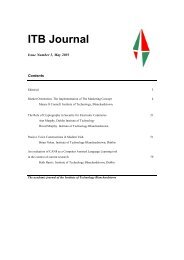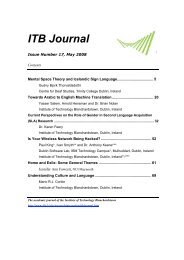Validation Report BN525 - Institute of Technology Blanchardstown
Validation Report BN525 - Institute of Technology Blanchardstown
Validation Report BN525 - Institute of Technology Blanchardstown
You also want an ePaper? Increase the reach of your titles
YUMPU automatically turns print PDFs into web optimized ePapers that Google loves.
Programme validation report<br />
ITB<br />
<strong>Validation</strong> <strong>Report</strong><br />
<strong>BN525</strong><br />
Master <strong>of</strong> Business<br />
(90 ECTS credits leading to NFQ Level 9 Award)<br />
BN522<br />
Postgraduate Diploma in Business<br />
(60 ECTS credits leading to NFQ Level 9 Award)<br />
<strong>BN525</strong> Page 1 <strong>of</strong> 14 29 th April 2010
Programme validation report<br />
ITB<br />
Introduction<br />
The <strong>Institute</strong> <strong>of</strong> <strong>Technology</strong> <strong>Blanchardstown</strong> was established in 1999. The<br />
mission <strong>of</strong> the <strong>Institute</strong> is to serve its students and the community by meeting the<br />
skills needs in the economy and increasing the level <strong>of</strong> participation in third-level<br />
education and training, particularly in Dublin North-West and its environs.<br />
The <strong>Institute</strong> in 2006 was awarded delegated authority enabling the<br />
development, validation, implementation and continuous improvement <strong>of</strong> its<br />
existing taught higher education and training programmes up to and including<br />
level 9 <strong>of</strong> the National Framework <strong>of</strong> Qualifications.<br />
In keeping with the <strong>Institute</strong>’s mission statement, course and programme<br />
development is on-going. The Department <strong>of</strong> Business aims to continually update<br />
its <strong>of</strong>fering to the local region, ensuring that it delivers qualifications that are<br />
timely, appropriate and relevant. As such the department feels it is timely to<br />
design and deliver a Level 9 programme in business so as to better serve the<br />
needs <strong>of</strong> Dublin North West and beyond. This programme supports the mission<br />
<strong>of</strong> the <strong>Institute</strong> and facilitates much wider access to the <strong>Institute</strong> by a cohort <strong>of</strong><br />
potential students whose needs are currently not being met.<br />
The purpose <strong>of</strong> this document is to report on the findings <strong>of</strong> the peer review panel<br />
established to validate this proposed programme against the criteria for the<br />
validation <strong>of</strong> programmes as stipulated in the <strong>Institute</strong> policy document 2MP01 I .<br />
This submission by the School <strong>of</strong> Business and Humanities evolved through:<br />
• examining the competence, expertise and experience <strong>of</strong> it’s staff in<br />
addition to the strategy <strong>of</strong> the department/school/<strong>Institute</strong> and Government<br />
educational policy.<br />
• student led demand for an NFQ Level 9 qualification in business.<br />
I 2MP01 Design, validation and accreditation <strong>of</strong> new academic programmes<br />
<strong>BN525</strong> Page 2 <strong>of</strong> 14 29 th April 2010
Programme validation report<br />
ITB<br />
Programme overview<br />
Given the current economic climate the Department <strong>of</strong> Business has proposed<br />
this programme in response to research evidence and industry feedback within<br />
the <strong>Institute</strong>’s immediate catchment area highlighting a need to produce<br />
graduates who are problem solvers and decision makers, who can <strong>of</strong>fer<br />
employers in both private and public sectors a portfolio <strong>of</strong> skills and expertise<br />
vital to the success <strong>of</strong> any organisation operating in an increasingly competitive<br />
environment. Furthermore the current vision <strong>of</strong> the HEA I is to foster innovative<br />
and creative graduates equipped with the skills needed to perform successfully<br />
in a competitive environment and contribute to fostering an enterprise culture.<br />
The proposed Master <strong>of</strong> Business programme is <strong>of</strong> a one year (12 month)<br />
duration.<br />
The proposed programme aims to enable learners to develop advanced core<br />
competencies in business, to build on learning and business skills already<br />
gained at honours Bachelor <strong>of</strong> Business Level (or cognate discipline) and to<br />
further develop the analytical skills and academic experience <strong>of</strong> students whilst<br />
providing the opportunity to engage in industry research. The curriculum <strong>of</strong>fers<br />
a richness and variety <strong>of</strong> learning that will ensure students develop a range <strong>of</strong><br />
high-level knowledge and skill in research, strategic thinking and reflective<br />
learning. Students will further develop an ability to integrate knowledge, manage<br />
complexity and formulate judgements thereby establishing the foundation for a<br />
successful career. Students will be immersed in the following core module areas<br />
delivered through the use <strong>of</strong> case studies, team work, group projects, problem<br />
based learning and research projects:<br />
Service excellence<br />
Strategy and leadership<br />
Research methods<br />
Innovation and creativity<br />
Enterprise resource systems and business intelligence<br />
Accounting information for decision making<br />
Study <strong>of</strong> these core areas will produce graduates who are independent and<br />
innovative thinkers with a sound understanding <strong>of</strong> theoretical issues and a<br />
leading edge in business thinking.<br />
Strong links will be fostered between students and companies based in the<br />
Learning and Innovation Centre (LINC - ITB’s tangible link between the <strong>Institute</strong><br />
and the business community) on campus. The dissertation will provide students<br />
I The Higher Education Authority (HEA) is the statutory planning and development body for higher education and<br />
research in Ireland.<br />
<strong>BN525</strong> Page 3 <strong>of</strong> 14 29 th April 2010
Programme validation report<br />
ITB<br />
with an opportunity to carry out a practical project applying theoretical knowledge<br />
to a specific organisational or management problem or issue facing a LINC<br />
company. Projects will be carried out on real situations that the companies face<br />
but which are not critical to their business. Students will gain experience in<br />
handling data in an organisational setting and in applying relevant concepts and<br />
theories from their programme <strong>of</strong> study as appropriate to the research context.<br />
Furthermore, students who choose to work with LINC companies will have<br />
access to the new, state <strong>of</strong> the art, entrepreneurship lab based in the LINC. The<br />
lab will provide a creative hot desk environment for students <strong>of</strong> the proposed<br />
programme allowing them to work in an industry environment while completing<br />
their dissertation.<br />
<strong>BN525</strong> Page 4 <strong>of</strong> 14 29 th April 2010
Programme validation report<br />
ITB<br />
Programme detail<br />
Programme title<br />
Master <strong>of</strong> Business<br />
Award title<br />
Master <strong>of</strong> Business<br />
NFQ I level 9<br />
ECTS II credits 90<br />
Programme code<br />
<strong>BN525</strong><br />
Banner code<br />
BN_BMSBB_R<br />
Exit award<br />
Banner code<br />
ITB<br />
code<br />
Programme title Award title ECTS<br />
credits<br />
Format<br />
BN_BMSBB_G BN522 Postgraduate Diploma in<br />
Business<br />
Postgraduate<br />
Diploma in<br />
Business<br />
Level 9<br />
60 credits<br />
Ab initio<br />
I National Framework <strong>of</strong> Qualifications<br />
II European Credit Transfer and Accumulation System<br />
<strong>BN525</strong> Page 5 <strong>of</strong> 14 29 th April 2010
Programme validation report<br />
ITB<br />
Panel members<br />
Chairperson<br />
Mr. Dermot Finan (Registrar retired)<br />
<strong>Institute</strong> <strong>of</strong> <strong>Technology</strong> Sligo<br />
Panel member 1<br />
Dr. Ann Torres<br />
National University <strong>of</strong> Ireland Galway<br />
Panel member 2<br />
Dr. Sheila O’Donohoe<br />
Waterford <strong>Institute</strong> <strong>of</strong> <strong>Technology</strong><br />
Panel member 3<br />
Dr. Cathal Brugha<br />
University College Dublin<br />
Panel member 4<br />
Ms. Maria Callinan<br />
Laois County Enterprise Board Limited<br />
In attendance<br />
Dr. Diarmuid O’Callaghan<br />
IT <strong>Blanchardstown</strong><br />
Mr. Michael Keane<br />
IT <strong>Blanchardstown</strong><br />
Date <strong>of</strong> Panel Meeting Wednesday 28 th April 2010<br />
<strong>BN525</strong> Page 6 <strong>of</strong> 14 29 th April 2010
Programme validation report<br />
ITB<br />
<strong>Institute</strong> staff present<br />
Session I<br />
Meeting with Head <strong>of</strong> School and programme leaders<br />
Mr. Michael Tobin, former Head <strong>of</strong> School <strong>of</strong> Business and Humanities<br />
Mr. Pat O’Connor, Head <strong>of</strong> Department <strong>of</strong> Business<br />
Ms. Patricia Doherty<br />
Mr. Gary Bernie<br />
Ms. Tara Rooney<br />
Mr. Brian Watters<br />
Mr. Liam Bolger<br />
Session II<br />
Meeting with lecturing staff<br />
Mr. Michael Tobin, former Head <strong>of</strong> School <strong>of</strong> Business and Humanities<br />
Mr. Pat O’Connor, Head <strong>of</strong> Department <strong>of</strong> Business<br />
Ms. Patricia Doherty<br />
Mr. Gary Bernie<br />
Ms. Tara Rooney<br />
Mr. Brian Watters<br />
Mr. Liam Bolger<br />
Ms. Assumpta Harvey, LINC<br />
Mr. Thomas Mulvey<br />
Mr. Terence Sheridan<br />
<strong>BN525</strong> Page 7 <strong>of</strong> 14 29 th April 2010
Programme validation report<br />
ITB<br />
Panel findings<br />
In evaluating the appropriateness, quality and proposed operation <strong>of</strong> this<br />
programme the following criteria have been considered and is hereby reported<br />
upon:<br />
Strategic planning<br />
The panel was satisfied that the programme is in keeping with the <strong>Institute</strong>’s<br />
mission, that it does not constitute redundant provision and that it makes<br />
efficient use <strong>of</strong> resources. The panel following discussion was satisfied with the<br />
planned staffing arrangements but raised concerns over what it felt was an over<br />
dependence on certain staff with experience in delivering an NFQ level 9<br />
business programme.<br />
Evidence <strong>of</strong> consultation<br />
The panel was informed <strong>of</strong> how a comprehensive research effort was undertaken<br />
to validate the need for and the preferred structure <strong>of</strong> the proposed programme.<br />
Primary research activity involved qualitative feedback gleaned from a survey <strong>of</strong><br />
local industry and an interactive industry panel held on the ITB campus. Student<br />
feedback was gathered by means <strong>of</strong> a student survey and an informal discussion<br />
session.<br />
The panel also heard how extensive secondary research activity explored Irish<br />
Government and European Union publications, Irish University and <strong>Institute</strong> <strong>of</strong><br />
<strong>Technology</strong> course documentation, print media articles and web resources.<br />
Learner employment potential<br />
On completion <strong>of</strong> this programme, it is envisaged that graduates will have the<br />
knowledge skills and competences to gain employment within multinational<br />
enterprises, consulting firms and government bodies and agencies in senior<br />
management roles in areas such as human resources, sales and marketing, and<br />
financial services.<br />
<strong>BN525</strong> Page 8 <strong>of</strong> 14 29 th April 2010
Programme validation report<br />
ITB<br />
Protection <strong>of</strong> learners<br />
Section 43 <strong>of</strong> the Act I does not apply.<br />
Quality assurance<br />
The panel was informed <strong>of</strong> how the submission had been developed and<br />
approved internally whilst complying with the <strong>Institute</strong>’s quality assurance policies<br />
and procedures. The panel concurred that said policies and procedures had<br />
been applied to the development <strong>of</strong> the proposed programme.<br />
Programme titles and award titles<br />
Following discussion, the panel was satisfied that the title <strong>of</strong> the proposed<br />
programme, and its exit award is clear, accurate and fit for the purpose <strong>of</strong><br />
informing prospective learners and other stakeholders and consistent with<br />
HETAC award titles.<br />
Ethics<br />
The panel was satisfied that the <strong>Institute</strong> has internal policies and procedures in<br />
place to ensure that all teaching, learning or research activity across the<br />
spectrum <strong>of</strong> NFQ levels is conducted / delivered in a manner that is both morally<br />
and pr<strong>of</strong>essionally ethical.<br />
Unity<br />
The panel found that the programme design is consistent with HETAC’s policy on<br />
accumulation <strong>of</strong> credits and certification <strong>of</strong> subjects, that it has an underlying<br />
unifying theme with modules bonded by linkages being either implicit or explicit. It<br />
was also clear to the panel how the standards <strong>of</strong> knowledge, skill and<br />
competence evolve throughout the programme as a whole.<br />
Teaching and learning<br />
The panel discussed with staff <strong>of</strong> the <strong>Institute</strong> the various modes <strong>of</strong> interaction<br />
practised with learners. Evidence <strong>of</strong> a clear dialogue was confirmed, enabling<br />
learners to develop and have available to them the support <strong>of</strong> academic staff.<br />
I Qualifications (Education and Training) Act, 1999<br />
<strong>BN525</strong> Page 9 <strong>of</strong> 14 29 th April 2010
Programme validation report<br />
ITB<br />
Course management arrangements were discussed and included:<br />
Course handbook<br />
Course induction<br />
Dissertation manual<br />
Research logbook<br />
Dissertation supervisors<br />
Survey <strong>of</strong> students by lecturer<br />
Summary <strong>of</strong> survey <strong>of</strong> students by lecturer<br />
Survey <strong>of</strong> students by department<br />
Course boards<br />
The panel following discussion was assured that the necessary staffing levels<br />
and sufficient support structures will be in place and commended the obvious<br />
energy and enthusiasm <strong>of</strong> the staff concerned. However the panel were <strong>of</strong> the<br />
opinion that further work was required to more clearly define protocols<br />
concerning the operational management, support and supervision <strong>of</strong> the<br />
research and dissertation delivery. See recommendation 9.<br />
Relevance<br />
The panel recognised that the proposed programme is in keeping with ITB’s<br />
mission statement to serve the needs <strong>of</strong> the local community and that it supports<br />
two priorities outlined in the <strong>Institute</strong>’s current strategic plan I namely, the<br />
achievement <strong>of</strong> a more diverse student community and making ITB a vital<br />
resource for the region.<br />
Learner assessment<br />
Through discussion with the design team, and from the submission document<br />
itself it was explained in detail to the panel the multiple modes <strong>of</strong> assessment,<br />
both formal and informal that will be employed. The panel were <strong>of</strong> the opinion<br />
that the use <strong>of</strong> reflective journals in isolation as a means <strong>of</strong> assessment be<br />
discouraged and recommended that another form <strong>of</strong> assessment be included to<br />
further assist the learner in acquiring the necessary skills and competencies to<br />
attain the required learning outcomes. See recommendations 7and 11.<br />
I Strategic Plan 2006 - 2011 making education accessible http://www.itb.ie/AboutITB/strategicplan.html<br />
<strong>BN525</strong> Page 10 <strong>of</strong> 14 29 th April 2010
Programme validation report<br />
ITB<br />
Standards <strong>of</strong> knowledge, skill and competence<br />
The panel felt having reviewed the syllabi and assessment methods that learners<br />
would be capable <strong>of</strong> attaining the standards <strong>of</strong> knowledge, skill or competence<br />
relevant for this award. However the panel was <strong>of</strong> the opinion that the learning<br />
outcomes <strong>of</strong> the programme should be reviewed and brought further in line with<br />
HETAC standards. See recommendation 1.<br />
Access, transfer and progression<br />
The programme incorporates the established procedures for access, transfer and<br />
progression allowing students to choose from various entry and exit points that<br />
support clear transfer and progression routes within the National Framework <strong>of</strong><br />
Qualifications (NFQ).<br />
<strong>BN525</strong> Page 11 <strong>of</strong> 14 29 th April 2010
Programme validation report<br />
ITB<br />
Decision <strong>of</strong> the panel<br />
The panel recommends the validation <strong>of</strong> the proposed programme including its<br />
exit award namely:<br />
Banner code<br />
ITB<br />
code<br />
Programme title Award title ECTS<br />
credits<br />
Format<br />
BN_BMSBB_R <strong>BN525</strong> Master <strong>of</strong> Business Master <strong>of</strong><br />
Business<br />
Level 9<br />
90 credits<br />
Ab initio<br />
BN_BMSBB_G BN522 Postgraduate Diploma<br />
in Business<br />
Postgraduate<br />
Diploma in<br />
Business<br />
Level 9<br />
60 credits<br />
Ab initio<br />
Panel recommendations<br />
1. Re-define the overall programme learning outcomes to further align them<br />
to HETAC standards for level 9 programmes in Business thus providing<br />
further clarity on the linkage between module learning outcomes,<br />
programme learning outcomes and resulting graduate skill sets and<br />
competencies.<br />
2. Review the minimum entry requirements to more clearly articulate the<br />
specific skill sets required for non business graduates wishing to enrol on<br />
this programme.<br />
3. Consider increasing the duration <strong>of</strong> the induction programme to a<br />
minimum <strong>of</strong> one week.<br />
4. Consider using explicit descriptors in establishing criteria for grading<br />
coursework for example where reflective journals are employed as a<br />
means <strong>of</strong> assessment.<br />
5. Consider replacing the changing environment <strong>of</strong> management accounting<br />
component within the accounting information for decision making module<br />
with key aspects <strong>of</strong> financial accounting and corporate governance whilst<br />
avoiding any overlap <strong>of</strong> NFQ level 8 content.<br />
<strong>BN525</strong> Page 12 <strong>of</strong> 14 29 th April 2010
Programme validation report<br />
ITB<br />
6. Review module content across the programme as a whole to further<br />
include and make more visible corporate governance and ethics and the<br />
application <strong>of</strong> same within the various domains i.e. services, finance etc.<br />
7. Consider introducing a second assessment within the service excellence<br />
module in addition to the reflective journal to further strengthen the<br />
learning outcomes <strong>of</strong> the module.<br />
8. Rebalance the proposed syllabus <strong>of</strong> the module strategy and leadership to<br />
further strengthen the content to that appropriate for NFQ level 9 whilst<br />
reducing NFQ level 8 content and broaden to incorporate emotional<br />
intelligence.<br />
9. Review the research methods and dissertation modules as follows:<br />
Demonstrate the linkage between the research methods and<br />
dissertation modules including the timing <strong>of</strong> specific related<br />
components.<br />
Cleary define protocols and stakeholder expectations regarding<br />
engagement with industry.<br />
Clearly define deadlines for all deliverables whilst stipulating protocols<br />
with regard to applications for extensions.<br />
Provide an indicative list <strong>of</strong> appropriate dissertation topics with related<br />
supervisors and provide at induction.<br />
Promote the use <strong>of</strong> a mentoring system to support staff with little<br />
previous dissertation supervision experience.<br />
Consider pairing students on dissertation topics during the first cycle <strong>of</strong><br />
the programme.<br />
Prepare a plan for the supervision <strong>of</strong> students during traditional holiday<br />
periods.<br />
10. Increase the weighting <strong>of</strong> the following assessments proposed in the<br />
module enterprise resource planning and business intelligence:<br />
o Proposal to implement a fully operational ERP system into a real or<br />
theoretical business, detailing costs, benefits and technical solution.<br />
o Research document on the use <strong>of</strong> business intelligence and their<br />
effectiveness in the Irish economic context.<br />
The panel were <strong>of</strong> the opinion that these were too light relative to the<br />
volume and benefit <strong>of</strong> the workload involved.<br />
<strong>BN525</strong> Page 13 <strong>of</strong> 14 29 th April 2010
Programme validation report<br />
ITB<br />
11. Consider including an additional/alternative means <strong>of</strong> assessment to the<br />
reflective journal within the module innovation and creativity.<br />
12. Make other technical and minor amendments as discussed at the panel<br />
meeting.<br />
Panel observations<br />
The panel commended the quality and detail <strong>of</strong> the proposal and the energy and<br />
enthusiasm <strong>of</strong> the staff involved. The panel however stressed the importance <strong>of</strong><br />
not underestimating the challenges and demands facing the team relating to<br />
dissertation support and supervision.<br />
Panel signatures<br />
Chairperson<br />
Mr. Dermot Finan _____________________ Date __________<br />
Secretary<br />
Dr. Diarmuid O’Callaghan _____________________<br />
Date __________<br />
<strong>BN525</strong> Page 14 <strong>of</strong> 14 29 th April 2010



